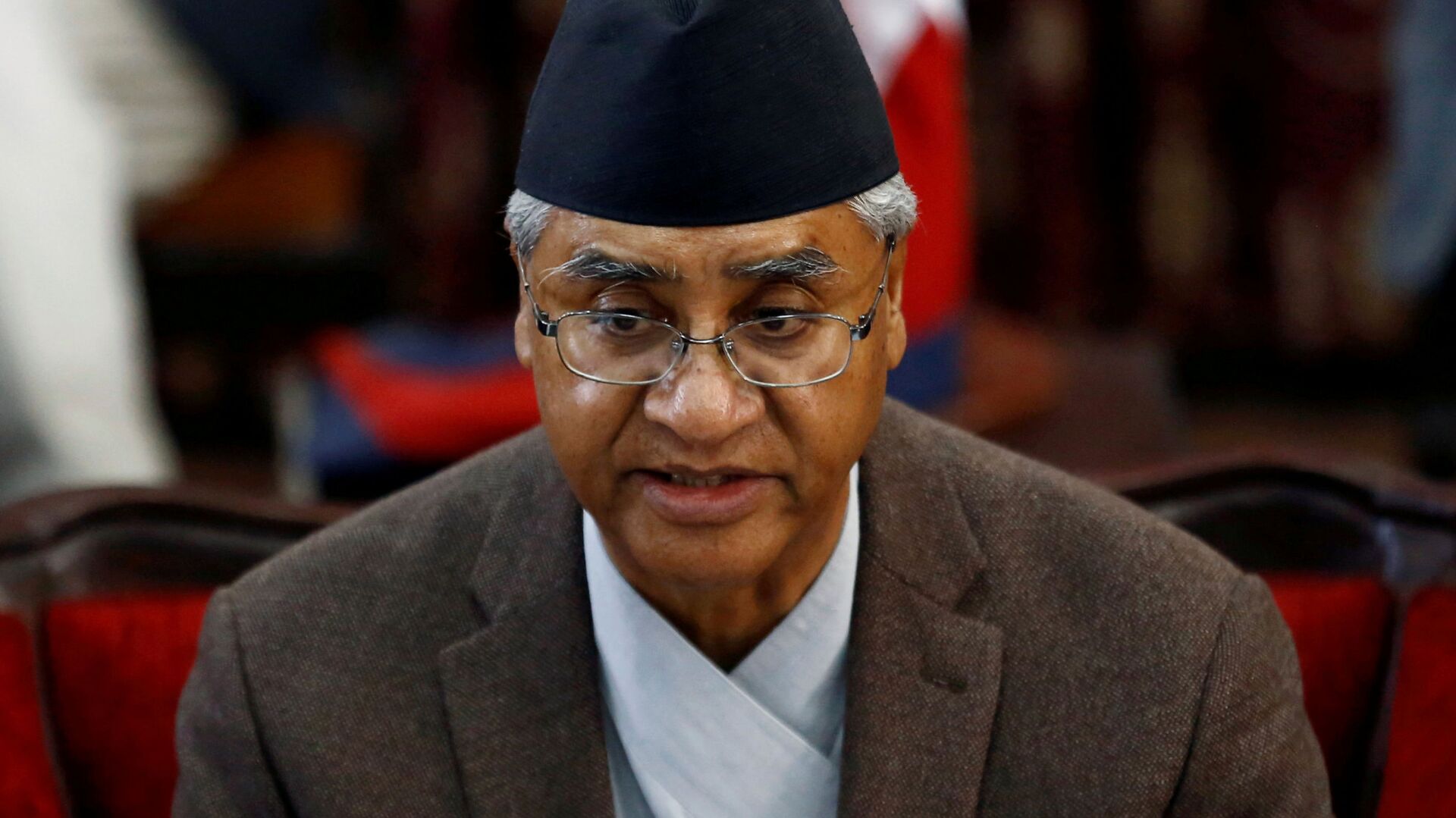https://sputnikglobe.com/20210712/nepal-supreme-court-appoints-opposition-leader-pm-overturns-presidents-order-1083366565.html
Nepal Supreme Court Appoints Opposition Leader PM, Overturns President's Order
Nepal Supreme Court Appoints Opposition Leader PM, Overturns President's Order
Sputnik International
Nepal was thrown into political turmoil after a power-sharing agreement between Prime Minister Khadga Prasad Sharma Oli and former PM Pushpa Kamal Dahal... 12.07.2021, Sputnik International
2021-07-12T14:17+0000
2021-07-12T14:17+0000
2021-07-12T14:17+0000
asia
world
newsfeed
sher bahadur deuba
khadga prasad sharma oli
nepal
china
https://cdn1.img.sputnikglobe.com/img/07e5/07/0c/1083367754_0:229:2829:1820_1920x0_80_0_0_1e28c90ba2b9fa6be4adc209c28cb8b9.jpg
Nepal's Supreme Court on Monday ordered that former Prime Minister and leader of the Nepali Congress, Sher Bahadur Deuba, be appointed executive head of the Himalayan nation which borders India and China.The five-member constitutional bench of the Supreme Court, which was ruling on a clutch of 30 petitions, called on President Bidya Devi Bhandari to appoint Deuba Prime Minister by 5pm on Tuesday (13 July) and summon the House of Representatives by 18 July.Keshav Rijal, a spokesman of Nepali Congress, told Sputnik from Kathmandu that Deuba still enjoys a “comfortable majority” to form the government in the next poll of the house, the date for which can be announced once the House of Representatives is re-convened on 18 July.He said that the five opposition parties would hold a meeting in the evening to decide on the floor strategy of the Deuba-led alliance.Deuba had staked a claim to form the government in the land-locked country as early as May this year, explaining to President Bhandari that since he enjoyed the support of 149 politicians in the 275-member house he was therefore entitled to having a shot at forming a government under Article 76 (5) of Nepal's constitution.However, he was refused by President Bhandari, who called for a snap federal election on 12 and 19 November. Her decision was challenged by the opposition alliance in the Supreme Court.Nepal was plunged into a political crisis on 20 December last year after Bhandari dissolved parliament on the advice of sitting Prime Minister Khadga Prasad Sharma Oli. Bhandari had then called for a snap poll on 30 April and 10 May.Oli’s decision also engineered a split in the ruling Nepal Communist Party (NCP), with another faction led by former Prime Minister Pushpa Kamal Dahal Prachanda joining the opposition alliance led by Deuba.Oli’s December decision, challenged in the Supreme Court, was cancelled in February this year. The court also ordered the House of Representatives to be convened.Oli, meanwhile, was allowed to continue ruling the country with his minority government.However, in May, President Bhandari yet again called for the House of Representatives to be dissolved, prompting opposition politicians yet again to approach the Supreme Court.
nepal
china
Sputnik International
feedback@sputniknews.com
+74956456601
MIA „Rossiya Segodnya“
2021
News
en_EN
Sputnik International
feedback@sputniknews.com
+74956456601
MIA „Rossiya Segodnya“
Sputnik International
feedback@sputniknews.com
+74956456601
MIA „Rossiya Segodnya“
newsfeed, sher bahadur deuba, khadga prasad sharma oli, nepal, china
newsfeed, sher bahadur deuba, khadga prasad sharma oli, nepal, china
Nepal Supreme Court Appoints Opposition Leader PM, Overturns President's Order
Nepal was thrown into political turmoil after a power-sharing agreement between Prime Minister Khadga Prasad Sharma Oli and former PM Pushpa Kamal Dahal Prachanda resulted in infighting, prompting Oli to call for Parliament to be dissolved last November. China has tried but failed to forge peace between the two Nepal Communist Party (NCP) leaders.
Nepal's Supreme Court on Monday ordered that former Prime Minister and leader of the Nepali Congress, Sher Bahadur Deuba, be appointed executive head of the
Himalayan nation which borders India and China.
The five-member constitutional bench of the Supreme Court, which was ruling on a clutch of 30 petitions, called on President Bidya Devi Bhandari to appoint Deuba Prime Minister by 5pm on Tuesday (13 July) and summon the House of Representatives by 18 July.
Keshav Rijal, a spokesman of Nepali Congress, told Sputnik from Kathmandu that Deuba still enjoys a “comfortable majority” to form the government in the next poll of the house, the date for which can be announced once the House of Representatives is re-convened on 18 July.
“We have the support of four political parties — CPN-Maoist Centre, CPN-UML (Communist Party of Nepal-Unified Marxist Leninist), Janata Samajbadi Party-Nepal and Rastriya Janamorcha,” stated Rijal.
He said that the five opposition parties would hold a meeting in the evening to decide on the floor strategy of the Deuba-led alliance.
Deuba had staked a claim to form the government in the land-locked country as early as May this year, explaining to President Bhandari that since he enjoyed the support of 149 politicians in the 275-member house he was therefore entitled to having a shot at forming a government under Article 76 (5) of Nepal's constitution.
However, he was refused by President Bhandari, who called for a snap federal election on 12 and 19 November. Her decision was challenged by the opposition alliance in the Supreme Court.
Nepal was plunged into a
political crisis on 20 December last year after Bhandari dissolved parliament on the advice of sitting Prime Minister Khadga Prasad Sharma Oli. Bhandari had then called for a snap poll on 30 April and 10 May.
Oli’s decision also engineered a split in the ruling
Nepal Communist Party (NCP), with another faction led by former Prime Minister Pushpa Kamal Dahal Prachanda joining the opposition alliance led by Deuba.
Oli’s December decision, challenged in the Supreme Court, was cancelled in February this year. The court also ordered the House of Representatives to be convened.
Oli, meanwhile, was allowed to continue ruling the country with his minority government.
However, in May, President Bhandari yet again called for the House of Representatives to be dissolved, prompting opposition politicians yet again to approach the Supreme Court.


